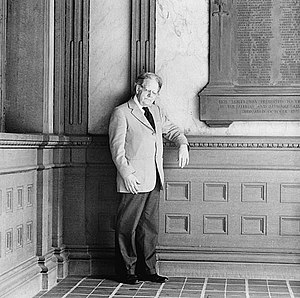
“The most technologically efficient machine that man has ever invented is the book.”
Share this quote:
“It is clear that all verbal structures with meaning are verbal imitations of that elusive psychological and physiological process known as thought, a process stumbling through emotional entanglements, sudden irrational convictions, involuntary gleams of insight, rationalized prejudices, and blocks of panic and inertia, finally to reach a completely incommunicable intuition.”
Share this quote:
“In our day the conventional element in literature is elaborately disguised by a law of copyright pretending that every work of art is an invention distinctive enough to be patented.”
Share this quote:
“The pursuit of beauty is much more dangerous nonsense than the pursuit of truth or goodness, because it affords a stronger temptation to the ego.”
Share this quote:
“Popular art is normally decried as vulgar by the cultivated people of its time; then it loses favor with its original audience as a new generation grows up; then it begins to merge into the softer lighting of quaint, and cultivated people become interested in it, and finally it begins to take on the archaic dignity of the primitive.”
Share this quote:
“Just as a new scientific discovery manifests something that was already latent in the order of nature, and at the same time is logically related to the total structure of the existing science, so the new poem manifests something that was already latent in the order of words.”
Share this quote:
“The metaphor of the king as the shepherd of his people goes back to ancient Egypt. Perhaps the use of this particular convention is due to the fact that, being stupid, affectionate, gregarious, and easily stampeded, the societies formed by sheep are most like human ones.”
Share this quote:
“A reader who quarrels with postulates, who dislikes Hamlet because he does not believe that there are ghosts or that people speak in pentameters, clearly has no business in literature. He cannot distinguish fiction from fact, and belongs in the same category as the people who send checks to radio stations for the relief of suffering heroines in soap operas.”
Share this quote:
“Between religions this is and poetrys but suppose this is, there must always be some kind of tension, until the possible and the actual meet at infinity.”
Share this quote:
“Were art to redeem man, it could do so only by saving him from the seriousness of life and restoring him to an unexpected boyishness.”
Share this quote:
The poet, however, uses these two crude, primitive, archaic forms of thought (simile and metaphor) in the most uninhibited way, because his job is not to describe nature, but to show you a world completely absorbed and possessed by the human mind.
Share this quote:
For the Bible there is nothing numinous, no holy or divine presence, within nature itself. Nature is a fellow creature of man.
Share this quote:
(U)derneath all the complexity of human life that uneasy stare at an alien nature is still haunting us, and the problem of surmounting it is still with us.
Share this quote:
Illusion is whatever is fixed or definable, and reality is best understood as its negation…
Share this quote:
So, you may ask, what is the use of studying the world of imagination where anything is possible and anything can be assumed, where there are no rights or wrongs and all arguments are equally good? One of the most obvious uses, I think, is its encouragement of tolerance. In the imagination our own beliefs are also only possibilities, but we can also see the possibilities in the beliefs of others. Bigots and fanatics seldom have any use for the arts, because theyre so preoccupied with their beliefs and actions that they cant see them as also possibilities. Its possible to go to the other extreme, to be a dilettante so bemused by possibilities that one has no convictions or power to act at all. But such people are much less common than bigots, and in our world much less dangerous.
Share this quote:
Literature keeps presenting the most vicious things to us an entertainment, but what it appeals to is not any pleasure of these things, but the exhilaration of standing apart from them and being able to see them for what they are because they arent really happening. The more exposed we are to this, the less likely we are to find an unthinking pleasure in cruel or evil things. As the eighteenth century said in a fine mouth-filling phrase, literature refines our sensibilities.
Share this quote:
Literature is still doing the same job that mythology did earlier, but filling in its huge cloudy shapes with sharper lights and deeper shadows.
Share this quote:
A person who knows nothing about literature may be an ignoramus, but many people dont mind being that.
Share this quote:
What the critic as a teacher of language tries to teach is not an elegant accomplishment, but the means of conscious life. Literary education should lead not merely to the admiration of great literature, but to some possession of its power of utterance. The ultimate aim is an ethical and participating aim, not an aesthetic or contemplative one, even though the latter may be the means of achieving the former.
Share this quote:
Wisdom is the central form which gives meaning and position to all the facts which are acquired by knowledge, the digestion and assimilation of whatever in the material world the man comes in contact with.
Share this quote: